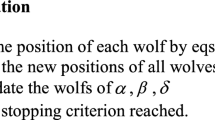Abstract
Discounted 0-1 knapsack problem (D0-1KP) has been proved to be NP-hard, thus a lot of researches focus on designing non-deterministic algorithms to solve it. Group theory-based optimization algorithm (GTOA), as a recently proposed evolutionary algorithm (EA), can provide satisfactory results to D0-1KP. GTOA introduces important theories of algebra, i.e., group theory, to describe combinatorial optimization problems, and applies the classic operations in group theory to design operators for EA. In order to generate a better solution according to a set of existing solutions during each evolutionary iteration, an important operator called random linear combination operator (RLCO) is designed. However, the practical meaning of applying the operations in group theory is hard to explain, and the proposed RLCO is lack of interpretability, causing difficulties in analyzing and improving the algorithm. In this paper, to improve the interpretability and further enhance the performance, we propose a new operator named random xor operator (RXO), and interpret it from the view point of bitwise operation. By replacing RLCO with RXO, a new GTOA algorithm is realized for D0-1KP. Experimental results demonstrate that it can provide very competitive performance.




Similar content being viewed by others
References
Ali IM, Essam D, Kasmarik K (2021) Novel binary differential evolution algorithm for knapsack problems. Inf Sci 542:177–194
Alsuwaiyel MH (2009) Algorithms design techniques and analysis. World Scientific Puyblising Company, Singapore
Baioletti M, Milani A, Santucci V (2017) Algebraic particle swarm optimization for the permutations search space. In: Proceedings of 2017 IEEE congress on evolutionary computation (CEC)
Chen Y, Hao J-K (2016) Memetic search for the generalized quadratic multiple knapsack problem. IEEE Trans Evol Comput 20(6):908–923
Cormen TH, Leiserson CE, Rivest RL, Stein C (2001) Introduction to algorithms. The MIT Press, Cambridge
Dahmani I, Hifi M, Saadi T, Yousef L (2020) A swarm optimization-based search algorithm for the quadratic knapsack problem with conflict graphs. Expert Syst Appl 148(113224):1–13
Dorigo M, Sttzle T (2004) Ant colony optimization. MIT Press, Cambridge
He Y-C, Liu K (2007) Greedy genetic algorithm for solving knapsack problems and its application. Comput Eng Des 28(11):2655–2657
He Y-C, Wang X-Z (2021) Group theory-based optimization algorithm for solving knapsack problems. Knowl Based Syst 219(3):104445
He Y-C, Wang X-Z, He Y-L, Zhao S-L, Li W-B (2016a) Exact and approximate algorithms for discounted 0-1 knapsack problem. Inf Sci 369:634–647
He Y-C, Zhang X-L, Li W-B (2016b) Algorithms for randomized time-varying knapsack problems. J Combin Optim 31(1):95–117
He Y-C, Wang X-Z, Li W-B, Zhang X-L, Chen Y-Y (2016) Research on genetic algorithms for the discounted 0–1 knapsack problem. Chin J Comput 38(12):2614–2630
Kellerer H, Pferschy U, Pisinger D (2004) Knapsack problems. Springer, Berlin
Kennedy J, Eberhart R C (1997) A discrete binary version of the particle swarm algorithm. In: Proceedings of 1997 IEEE international conference on systems, man, and cybernetics. computational cybernetics and simulation
Kumar A, Misra RK, Singh D (2017) Improving the local search capability of effective butterfly optimizer using covariance matrix adapted retreat phase. In: 2017 IEEE congress on evolutionary computation (CEC). IEEE
Li Z, Li N (2009) A novel multi-mutation binary particle swarm optimization for 0/1 knapsack problem. In: Proceedings of 2009 Chinese control and decision conference
Li KL, Dai GM, Li QH (2003) A genetic algorithm for the unbounded knapsack problem. In: Proceedings of 2003 international conference on machine learning and cybernetics
Liu X-J, He Y-C (2019) Estimation of distribution algorithm based on levy flight for solving the set-union knapsack problem. IEEE Access 7:132217–132227
Martello S, Toth P (1990) Knapsack problems: algorithms and computer implementations
Mirjalili S (2015a) The ant lion optimizer. Adv Eng Softw 83:80–98
Mirjalili S (2015b) Moth-flame optimization algorithm a novel nature-inspired heuristic paradigm. Knowl Based Syst 89:228–249
Mirjalili S, Mirjalili MS, Lewis A (2014) Grey wolf optimizer. Adv Eng Softw 69:46–61
Robinson DJS (2003) A course in the theory of groups, 2nd edn. Springer, New York
Rong A, Figueira JR, Klamroth K (2012) Dynamic programming based algorithms for the discounted 0–1 knapsack problem. Appl Math Comput 218:6921–6933
Rotman JJ (2008) A first course in abstract algebra, 3rd edn. Prentice Hall, New Jersey
Santucci V, Baioletti M, Milani A (2016) A differential evolution algorithm for the permutation flowshop scheduling problem with total flow time criterion. IEEE Trans Evol Comput 20(5):628–694
Spears WM (2000) Evolutionary algorithms: the role of mutation and recombination. Springer, Berlin
Wang R, Zhang Z (2021) Set theory based operator design in evolutionary algorithms for solving knapsack problems. IEEE Trans Evol Comput (in press). https://doi.org/10.1109/TEVC.2021.3080683
Acknowledgements
This work was supported in part by the National Natural Science Foundation of China (Grant 62176160, Grant 61772344, Grant 61472257, and Grant 62006158), in part by the Natural Science Foundation of Shenzhen (University Stability Support Program nos. 20200804193857002 and 20200810150732001), in part by the Natural Science Foundation of Guangdong Province of China (Grant 2020B1515310008), and in part by the Interdisciplinary Innovation Team of Shenzhen University.
Author information
Authors and Affiliations
Corresponding author
Rights and permissions
About this article
Cite this article
Wang, R., Zhang, Z., Ng, W.W.Y. et al. An improved group theory-based optimization algorithm for discounted 0-1 knapsack problem. Adv. in Comp. Int. 1, 9 (2021). https://doi.org/10.1007/s43674-021-00010-y
Received:
Revised:
Accepted:
Published:
DOI: https://doi.org/10.1007/s43674-021-00010-y




